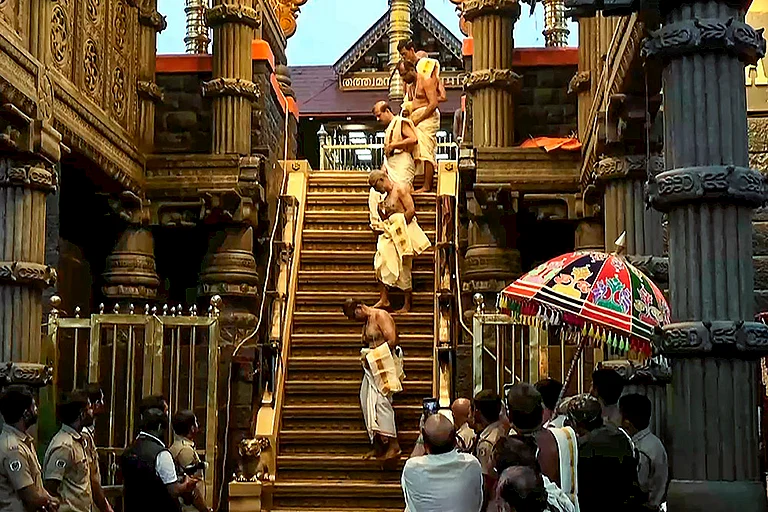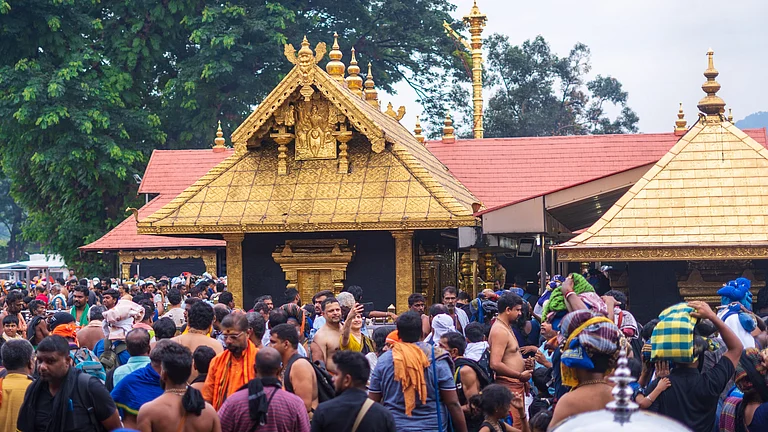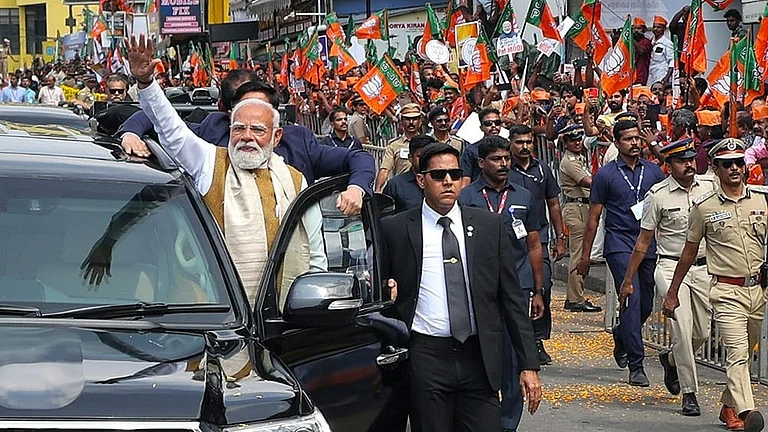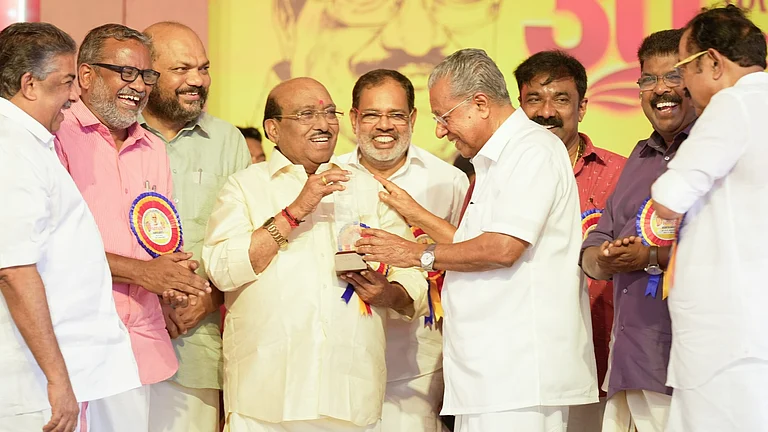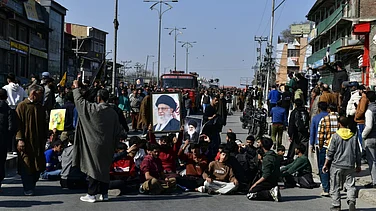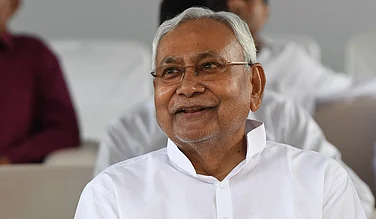
Summary of this article
Kerala’s CPI(M) government, long known for rationalism, now borrows faith to host a Global Ayyappa Sangamam—a dramatic bid to undo the wounds of the 2018 Sabarimala storm.
Stalin skips, BJP revolts, Congress scoffs—what was meant as reconciliation with devotees is fast turning into a stage for irony and accusation.
Behind the chants of Swamiye Saranam Ayyappa lies cold electoral arithmetic—Kerala’s Left trying to blunt the BJP, reclaim Hindus, and survive 2026.
On September 20, the quiet riverbank at Pampa—where pilgrims usually bathe before their arduous climb to the Sabarimala shrine—will turn into something else altogether. Giant pandals, air-conditioned halls, LED screens, cultural stages, digital exhibitions, and seminar spaces are being erected on the fragile riverbed. Nearly 3,000 delegates are expected to gather: priests, academics, bureaucrats, and politicians.
Officially, this is the platinum jubilee celebration of the Travancore Devaswom Board. But to anyone watching closely, the Global Ayyappa Sangamam is not just another cultural event. It is Kerala’s ruling CPI(M)’s grand gamble—a calculated attempt to reclaim the religious ground it lost during the Sabarimala crisis of 2018.
The irony, however, is as glaring as the floodlights that will illuminate the Pampa sands: an atheist Communist party organising a global summit on Lord Ayyappa.https://www.outlookindia.com/national/instances-in-ancient-indian-texts-and-love-songs-that-celebrate-queer-relationships-magazine-223384
Borrowed Scripts and Political Wounds
The inspiration comes from across the Western Ghats. Last year, the DMK in Tamil Nadu—another party rooted in rationalism—organised the International Murugan Devotees’ Conference. Initially dismissed as gimmickry, it turned out to be a masterstroke, disarming the BJP’s “anti-Hindu” charge and reconnecting the DMK with Murugan’s rural devotees.
The CPI(M) wants to replicate that playbook. But Kerala’s terrain is thornier. In 2018, when the Supreme Court lifted the age bar on women entering Sabarimala, the Pinarayi Vijayan government enforced it with police escorts. Two women—Bindu Ammini and Kanakadurga—entered the sanctum, and the state went up in flames.
Sangh Parivar affiliates paralysed Kerala with violent agitations, devotees clashed with police, and pilgrimage routes turned into battlefields. In the 2019 Lok Sabha polls that followed, the CPI(M)-led LDF was routed—reduced to just one of Kerala’s 20 seats. The Congress-led UDF won 19 seats, while the BJP consolidated its Hindu vote base.
The shadow of Sabarimala still haunts the Left. Its 2024 Lok Sabha performance—just one seat, with the UDF taking 18 and the BJP opening its account in Kerala—has only sharpened the anxiety. The Global Ayyappa Sangamam aims to be a corrective: a reconciliation with devotees, a statement that Communists can also be custodians of faith.
Stalin and the Irony of Rationalism
The headline guest was to be none other than DMK chief and Tamil Nadu Chief Minister M.K. Stalin. A rationalist atheist, the son of the late Karunanidhi and heir to Periyar’s legacy of scorning temples and rituals, was invited to inaugurate an Ayyappa summit.
For the BJP, it was manna from heaven. “This is blasphemy,” thundered Kerala BJP president Rajeev Chandrasekhar. “How dare Communists and atheists insult devotees by turning Lord Ayyappa into political theatre?” he raised the question by convening a press meet.
Tamil Nadu BJP chief Nainar Nagenthiran joined the chorus, accusing the CPI(M) and DMK of conspiring to “fool Hindu voters” before elections in both states. He released video clips of DMK leaders Udhayanidhi Stalin, A. Raja, and T.R. Baalu mocking Hindu practices, asking: “Are these the people Kerala wants on the Pampa banks?”
Caught in the storm, Stalin backtracked. He told a Kerala delegation he was tied up with prior engagements. Instead, he deputed two ministers—P.K. Sekarbabu and P.T.R. Palanivel Thiaga Rajan—to represent the state of Tamil Nadu. Both are practising Hindus, sporting kumkum, with personal ties to Sabarimala. Thiaga Rajan’s grandfather even installed the panchaloka idol of Ayyappa in the 1950s.
It was a careful balancing act. As DMK insiders explain: “The message is simple—DMK is not anti-Hindu. Stalin shows respect by sending staunch devotees in his place. It busts the BJP’s anti-Hindu propaganda.”
But in Kerala, the irony remained: atheists borrowing believers to sanctify their summit of faith.
From the Right and the Centre, Fire
The BJP and Sangh Parivar were not the only critics. Hindu outfits, such as the Vishva Hindu Parishad (VHP) and the Sabarimala Karma Samithi, warned of mass protests.
VHP state president Viji Thampi called the summit unconstitutional: “How can a secular government organise a religious congregation? This is merely an attempt to sneak activists back into the shrine. We will not allow another 2019.”
The Congress smelled political opportunism. Opposition leader V.D. Satheesan accused the Left of “appeasing majority communalism” to recover from its electoral wipe-out. “Since when did Communists discover love for Ayyappa? They should just hold the event with the Sangh Parivar—they are aligned anyway,” he said in response to questions from media persons.
Voices From Devotees and Critics
Among devotees, unease runs deep. Pilgrimage organisers highlight collapsing infrastructure, inadequate sanitation, poor waste management, and environmental stress. “If the government truly cared, it would fix basic amenities,” said Radhakrishnan Nair of Pandalam. “Instead, it’s spending crores on a political carnival.”
And for reformists like Bindu Ammini, the summit is a betrayal: “This event cements orthodoxy. It offers nothing for women. I will not attend,” she said.
The Tightrope of Faith and Power
The contradictions are glaring. The CPI(M) enforced the Supreme Court verdict, alienating devotees. Since then, it has backtracked, tacitly allowing the old ban to continue, disappointing reformists. Now it seeks to rebrand itself as the protector of Ayyappa devotion—without addressing women’s rights, ecological fragility, or pilgrim welfare.
It is a political tightrope: acknowledge women’s entry, and risk another backlash; sidestep it, and confirm charges of hypocrisy.
Meanwhile, the BJP prepares to weaponise both outcomes. The Congress accuses the Left of saffron appeasement. The DMK juggles rationalism and ritual. And devotees wonder if any of this will give them cleaner toilets, safer queues, or protection from flash floods.
A Summit of Ironies
In its essence, Ayyappa worship is about humility and equality. Pilgrims wear black, erase caste markers, walk barefoot, and surrender ego. By turning that ethic into a political spectacle of lights and speeches, the Left risks hollowing out its very meaning.
The Global Ayyappa Sangamam was conceived as a healing initiative. Yet, as the date nears, it looks more like a theatre of contradictions—where atheist Communists invoke a god of seclusion, rationalists preside over rituals, and saffron forces denounce what they secretly covet.
For Kerala’s CPI(M), the gamble is clear: reclaim faith without renouncing ideology, win back devotees without provoking reformists, blunt the BJP without alienating minorities. Whether this high-wire act succeeds or collapses into cynicism will shape Kerala’s political future.
For now, on the fragile sands of Pampa, the chants of Swamiye Saranam Ayyappa mix uneasily with the drumbeats of electoral politics.





